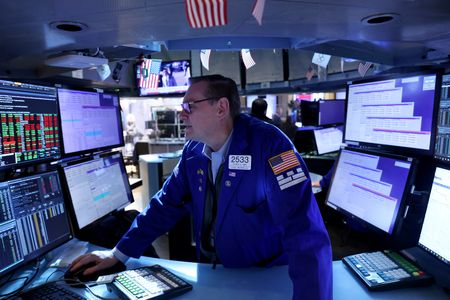 1
1 1
1

By Herbert Lash
NEW YORK (Reuters) – Global stock markets fell on Monday, pulled lower by technology shares in Europe and on Wall Street, as U.S. Treasury yields jumped ahead of inflation data that could prompt the Federal Reserve to tighten policy enough to slow a rebounding economy.
The euro rose against the dollar to snap a seven-day losing streak as the single currency rallied after French leader Emmanuel Macron beat far-right challenger Marine Le Pen in France’s first round of presidential voting on Sunday.
The dollar held just below almost two-year highs against a basket of currencies and strengthened against the Japanese yen, up 0.88%, and versus the commodity currencies – the Canadian, Australian and New Zealand dollars.
The yield on benchmark 10-year Treasuries rose more than 7 basis points to 2.793%, the highest level since January 2019.
Yields have surged in anticipation of Fed rate hikes, which Dec Mullarkey, managing director of investment strategy and asset allocation at SLC Management, expects to be by 50 basis points at each of the Fed’s next three policy meetings.
“The Fed is going to move aggressively. The market has appropriately priced it in,” Mullarkey said.
“They don’t want to be an issue in the midterms,” Mullarkey added, referring to elections in November that will determine whether Republicans can wrest control from President Joe Biden’s Democrats in the U.S. Senate and House of Representatives. “They also do not want to be in the position where they don’t have inflation under control.”
Economists polled by Reuters forecast the U.S. consumer price index (CPI) on Tuesday would post an 8.4% year-over-year increase in March. Separately, they also saw the probability of a recession next year at 40%.
Technology shares, which have been underpinned by record low interest rates, fell 2% in Europe and 2.6% on Wall Street.
MSCI’s gauge of stocks across the globe closed down 1.33% and the pan-European STOXX 600 index slid 0.59% as regional bourses fell with the exception of France’s CAC 40.
On Wall Street, the Dow Jones Industrial Average fell 1.19%, the S&P 500 lost 1.69% and the Nasdaq Composite dropped 2.18%. All 11 S&P 500 sectors fell.
Volatility gripped French blue chips on the outlook for a tight Macron-Le Pen race in the final round of voting. French assets have underperformed as markets are uneasy about Le Pen’s agenda of protectionism, tax cuts and nationalization.
The CAC 40 index, which is off 1.5% so far in April as the STOXX 600 gains about 0.4%, closed up 0.12%.
“I don’t expect the French equity markets to rally until we have the second round – we expect a lot of volatility and range-bound trading,” said Mathieu Racheter, head of equity strategy at Julius Baer. “It is really a close call in the runoff.”
Overnight in Asia, MSCI’s broadest index of Asia-Pacific shares outside Japan fell 1.6% and the Nikkei 225 in Tokyo slid 0.61%.
Oil prices dropped by $4 a barrel, with Brent tumbling below $100 on plans to release record volumes of crude from strategic reserves and on continuing COVID-19 lockdowns in China.
U.S. crude futures fell $3.97 to settle at $94.29 a barrel while Brent settled down $4.30 at $98.48.
Palladium steadied after jumping as much as 5% on supply concerns following a recent suspension on trading of the metal sourced from Russia in the London metals hub, while gold was buoyed by inflation fears.
U.S. gold futures settled up 0.1% at $1,948.20 an ounce.
Bitcoin fell 5.66% to $39,748.60.
China’s inflation figures surprised on the high side on Monday although they were still relatively modest at 1.5% year-on-year in March.
But that still saw yields on China’s 10-year government bonds fall below U.S. Treasury yields for the first time in 12 years on Monday.
GRAPHIC: US-China https://fingfx.thomsonreuters.com/gfx/mkt/myvmnqlakpr/us-china.JPG
(Reporting by Herbert Lash, additional reporting by Samuel Indyk and Elizabeth Howcroft in London, Sruthi Shankar in Bengaluru; Editing by Philippa Fletcher, Angus MacSwan, Will Dunham and David Gregorio)